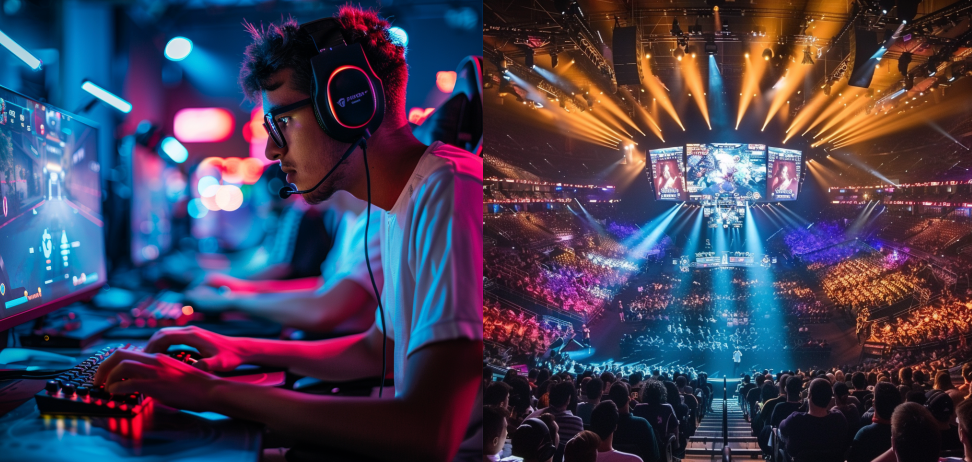In recent years, e-sports and online gaming have surged from niche pastimes to mainstream entertainment phenomena, capturing the attention of millions around the world. This rapid growth is not only reshaping the entertainment industry but also generating significant economic impacts. From packed stadiums and massive online audiences to lucrative sponsorships and career opportunities, e-sports is redefining what it means to be a spectator sport in the digital age.
The Meteoric Rise of E-Sports
E-sports, or competitive video gaming, has evolved dramatically over the past decade. What began as informal gatherings of gaming enthusiasts has transformed into a global spectacle with professional leagues, major tournaments, and dedicated e-sports arenas.
- Massive Viewership: Platforms like Twitch, YouTube Gaming, and Facebook Gaming have enabled millions of fans to watch live streams of their favourite games and players. Major tournaments, such as The International (Dota 2), League of Legends World Championship, and Fortnite World Cup, attract viewership numbers that rival traditional sports events. For instance, the 2021 League of Legends World Championship peaked at over 4 million concurrent viewers.
- Professionalisation and Infrastructure: The e-sports ecosystem has seen substantial investment in professionalisation. Teams and players are now supported by coaches, analysts, and managers, akin to traditional sports teams. State-of-the-art e-sports arenas, like the HyperX Esports Arena in Las Vegas, host large-scale events, further legitimising e-sports as a mainstream entertainment option.
- Diverse Game Genres: E-sports encompasses a wide range of game genres, from strategy and sports simulations to battle royales. This diversity allows it to appeal to a broad audience, ensuring that there is something for everyone.
Economic Implications
The rise of e-sports is not only changing the entertainment landscape but also creating substantial economic opportunities and impacts:
- Revenue Growth: The global e-sports market is projected to surpass $1.5 billion in 2024, driven by a combination of sponsorships, advertising, media rights, and ticket sales. Leading brands from various industries, including technology, energy drinks, and automotive, are investing heavily in e-sports sponsorships to tap into the highly engaged, predominantly young audience.
- Job Creation and Career Opportunities: The growth of e-sports has led to the creation of numerous jobs beyond just players. Event organisers, broadcasters, content creators, marketing specialists, and game developers are all part of the expanding e-sports ecosystem. Educational institutions are also offering e-sports management programs to prepare the next generation of industry professionals.
- Economic Boost to Host Cities: Hosting major e-sports events brings significant economic benefits to cities. These events attract thousands of attendees who spend on accommodation, food, and local attractions. Cities like Los Angeles, Seoul, and Shanghai have become e-sports hubs, benefiting from increased tourism and international exposure.
- Technological Advancements: The demand for high-quality streaming and immersive gaming experiences is driving advancements in technology. Innovations in virtual reality (VR), augmented reality (AR), and 5G connectivity are being accelerated by the needs of the e-sports industry, which in turn benefits other sectors.
Societal and Cultural Impact
E-sports is not just an economic force; it also has profound societal and cultural implications:
- Community Building: E-sports fosters a sense of community among players and fans. Online platforms and social media allow fans to connect, discuss strategies, and share their passion for games. Local e-sports clubs and college teams are also promoting social interaction and teamwork.
- Cultural Acceptance: As e-sports gains mainstream recognition, it is breaking down stereotypes associated with gaming. It is increasingly being accepted as a legitimate form of competition and entertainment, with professional gamers earning respect and admiration similar to traditional athletes.
- Youth Engagement: E-sports engages young people in unique ways, offering them role models and aspirations within the gaming world. It also encourages the development of skills such as strategic thinking, coordination, and teamwork.
The rise of e-sports and online gaming marks a significant shift in the entertainment industry, blending the digital and physical worlds in unprecedented ways. The economic implications are vast, with new revenue streams, job creation, and technological advancements. Culturally, e-sports is fostering community, breaking down stereotypes, and engaging a new generation. As e-sports continues to grow, its impact on both the economy and society will only deepen, solidifying its place as a mainstream form of entertainment in the 21st century.
Sonder Capital Limited, headquartered in London, is your strategic partner in the hospitality, leisure, retail, consumer and luxury goods sectors. With a commitment to excellence and innovation, we offer customised business strategies, comprehensive financial advisory services and harness cutting-edge technology to empower your success. Partner with us to unlock your business's full potential.

